-
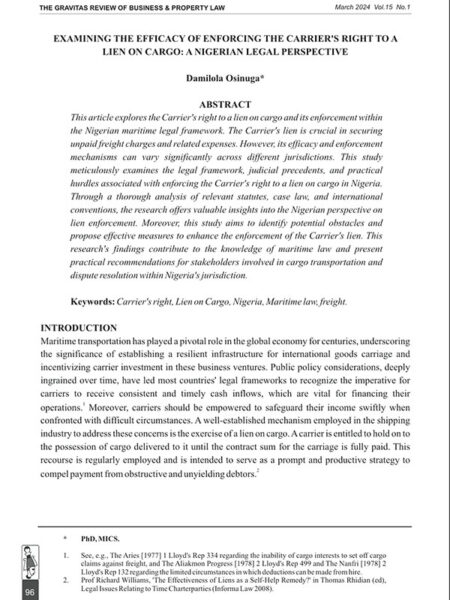
Examining the Efficacy of Enforcing the Carrier’s Right to a Lien on Cargo: A Nigerian Legal Perspective
0₦2,500.00Dr. Damilola Osinuga, in his article, Examining the Efficacy of Enforcing the Carrier’s Right to a Lien on Cargo: A Nigerian Legal Perspective, provides an in-depth exploration of the carrier’s right to a lien on cargo and its enforcement within the Nigerian maritime legal framework. The carrier’s lien plays a crucial role in securing unpaid freight charges and related expenses. However, its efficacy and enforcement mechanisms can vary significantly across different jurisdictions. Osinuga meticulously examines the legal framework, judicial precedents, and practical hurdles associated with enforcing the carrier’s right to a lien on cargo in Nigeria. Through a thorough analysis of relevant statutes, case law, and international conventions, the research offers valuable insights into the Nigerian perspective on lien enforcement. Osinuga aims to identify potential obstacles and propose effective measures to enhance the enforcement of the carrier’s lien.
-

Revisiting MT Eyuwa vs. Inspector General of Police: The Imposition of “Juridical Personality” on a Ship – A Shibboleth?
0₦2,500.00Dr. Osinuga, in his article, Revisiting MT Eyuwa vs. Inspector General of Police: The Imposition of “Juridical Personality” on a Ship – A Shibboleth? revisits the legal concept of ascribing legal personality to a ship in the light of the recent decision of the Nigerian Court of Appeal in MT Eyuwa v Inspector General of Police, that a ship has legal personality. The article suggests that the concept of a vessel’s legal personality may have been misunderstood by the appellate court.
-
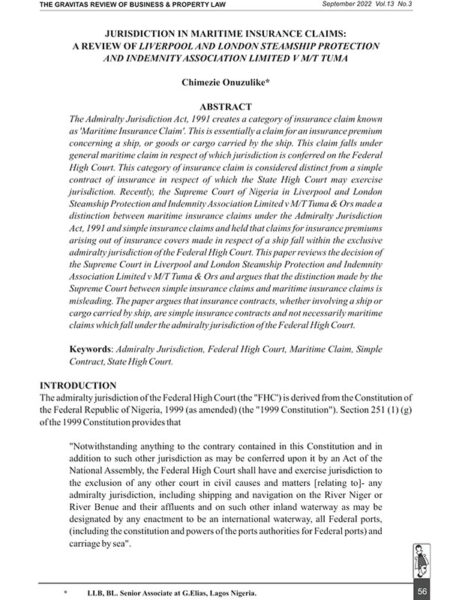
Jurisdiction in Maritime Insurance Claims: A Review of Liverpool and London Steamship Protection and Indemnity Association Limited V M/T Tuma
0₦2,500.00Chimezie Onuzulike, Senior Associate at G. Elias, in his article, Jurisdiction in Maritime Insurance Claims: A Review of Liverpool and London Steamship Protection and Indemnity Association Limited V M/T Tuma, explains that the Admiralty Jurisdiction Act 1991 creates a category of insurance claim known as ‘Maritime Insurance Claim’. This is essentially a claim for an insurance premium concerning a ship, or goods or cargo carried by the ship. This claim falls under general maritime claim in respect of which jurisdiction is conferred on the Federal High Court. This category of insurance claim is considered distinct from a simple contract of insurance in respect of which the State High Court may exercise jurisdiction. Recently, the Supreme Court of Nigeria in Liverpool and London Steamship Protection and Indemnity Association Limited v M/T Tuma made a distinction between maritime insurance claims under the Admiralty Jurisdiction Act 1991 and simple insurance claims and held that claims for insurance premiums arising out of insurance covers made in respect of a ship fall within the exclusive admiralty jurisdiction of the Federal High Court. Chimezie brilliantly reviews the decision of the Supreme Court in that case and argues that the distinction made by the Supreme Court between simple insurance claims and maritime insurance claims is misleading. He argues that insurance contracts, whether involving a ship or cargo carried by a ship, are simple insurance contracts and not necessarily maritime claims which fall under the admiralty jurisdiction of the Federal High Court.
-
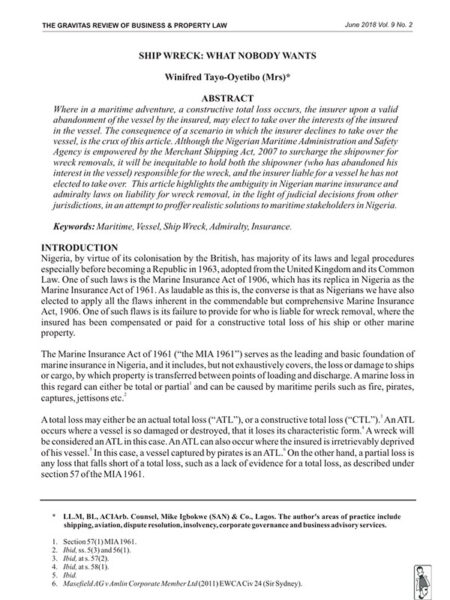
Ship Wreck: What Nobody Wants
0₦2,500.00Winifred Tayo-Oyetibo (Mrs) of Mike Igbokwe (SAN) & Co in her article, Ship Wreck: What Nobody Wants notes that where in a maritime adventure, a constructive total loss occurs, and the insurer having paid the shipowner declines to be saddled with the shipwreck, who then has the responsibility for its evacuation, removal or treatment? Tayo-Oyetibo in a masterly way argues that it will be inequitable to hold the shipowner who has abandoned his interest in the vessel responsible for the wreck, or the insurer who has elected not to take over, liable. She explores the provision of the Marine Insurance Act of 1961 and the 2007 highlighting the ambiguity in the Nigerian laws.
-
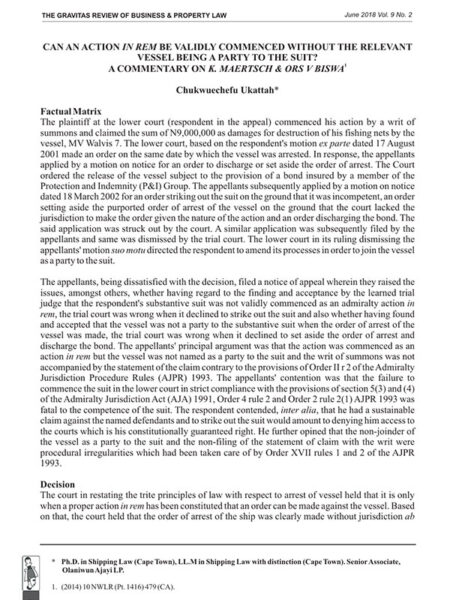
Can an Action In Rem be Validly Commenced Without the Relevant Vessel being A Party to the Suit? A Commentary on K. Maertsch & Ors v Biswa
0₦2,500.00Dr. Chukwuechefu Ukattah, Senior Associate, Olaniwun Ajayi LP asks a pertinent question in: Can an Action in Rem Be Validly Commenced Without The Relevant Vessel Being A Party To The Suit? A Commentary on K. Maertsch & Ors v Biswa. He reviews the decision of the Court of Appeal in the cited case, and using it as a background, explains the different types of admiralty actions and whether a proper action in rem can be constituted without the joinder of the vessel, and whether the non-joinder of the offending vessel in a suit for its arrest, is fatal to the action.
-
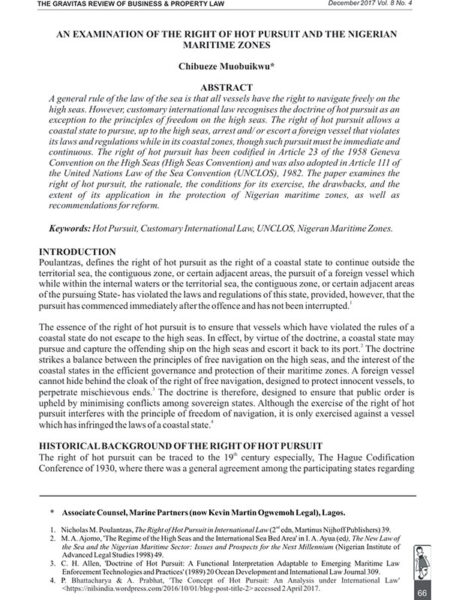
An Examination of the Right of Hot Pursuit and the Nigerian Maritime Zones
0₦2,500.00Chibueze Muobuikwu, Associate, Marine Partners, conducts “An Examination of the Right of Hot Pursuit and the Nigerian Maritime Zones”. He explains that the customary international law right of hot pursuit, allows a coastal state to pursue, up to the high seas, arrest and/or escort a foreign vessel that violates its laws and regulations while in its coastal zones. He notes that the right of hot pursuit has been codified by the Geneva Convention on the High Seas 1958, and adopted by the United Nations Law of the Sea Convention 1982. Chibueze examines the right of hot pursuit, the rationale, the conditions for its exercise, and the drawbacks, and the extent of its application in the protection of Nigerian maritime zones.
-
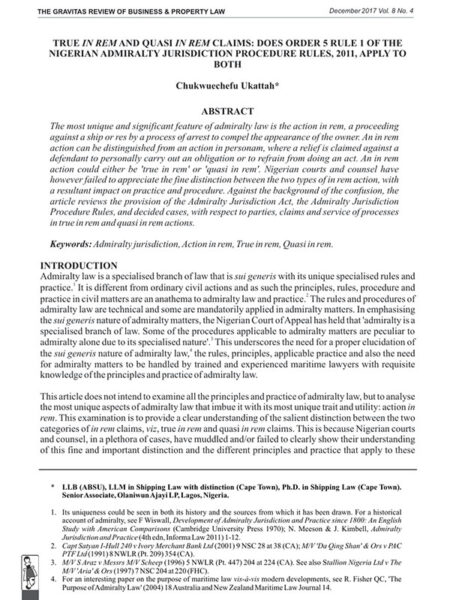
True in Rem and Quasi in Rem Claims: Does Order 5 Rule 1 of the Nigerian Admiralty Jurisdiction Procedure Rules 2011, Apply to Both
0₦2,500.00Dr. Chukwuechefu Ukattah, Senior Associate, Olaniwun Ajayi LP, in his article, “True In Rem and Quasi In Rem Claims: Does Order 5 Rule 1 of the Nigerian Admiralty Jurisdiction Procedure Rules, 2011, Apply to Both?”, notes that an in rem action could either be ‘true in rem’ or ‘quasi in rem’. He argues that Nigerian courts and counsel, have however failed to appreciate the distinction between the two types of in rem action, with a resultant impact on practice and procedure. Against the background of the confusion, he reviews the provision of the Admiralty Jurisdiction Act, the Admiralty Jurisdiction Procedure Rules, and decided cases, with respect to parties, claims and service of processes in true in rem and quasi in rem actions.
-
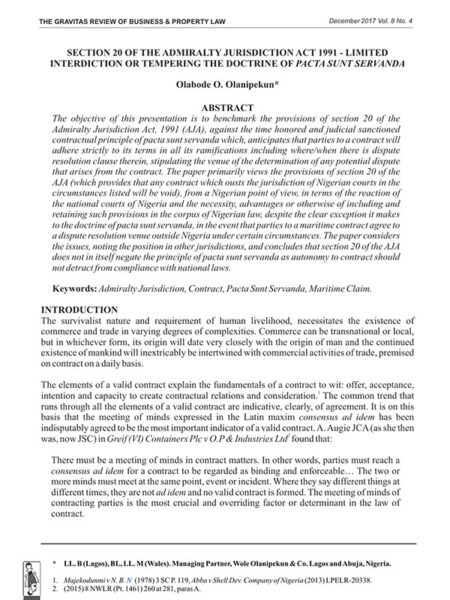
Section 20 of the Admiralty Jurisdiction Act 1991 – Limited Interdiction or Tempering the Doctrine of Pacta Sunt Servanda
0₦2,500.00Olabode Olanipekun, Managing Partner, Wole Olanipekun & Co, in his article, “Section 20 of the Admiralty Jurisdiction Act 1991 – Limited Interdiction or tempering the Doctrine of Pacta Sunt Servanda“, benchmarks the provision of section 20 of the Admiralty Jurisdiction Act, 1991, which invalidates any contractual provision that ousts the jurisdiction of Nigerian courts in the circumstances listed in the section, against the time honored and judicial sanctioned contractual principle of pacta sunt servanda, which anticipates that parties to a contract will adhere strictly to its terms in all its ramifications including the venue of the determination of any dispute that arises from the contract. He reviews the issues against the background of decided cases, noting the position in other jurisdictions, and concludes with a thought on the Hamburg Rules and dispute resolution.
-
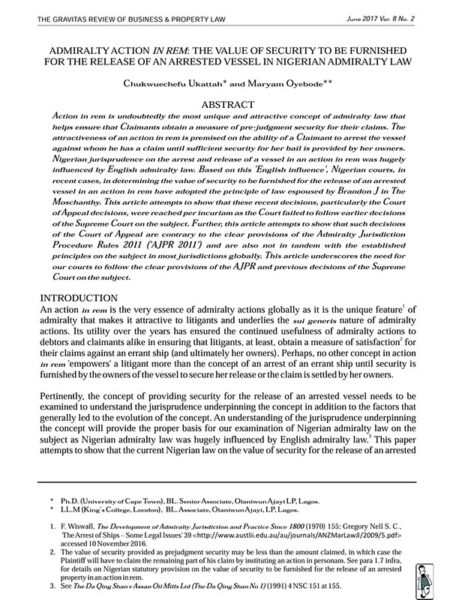
Admiralty Action in Rem: The Value of Security to be Furnished for the Release of an Arrested Vessel in Nigerian Admiralty Law
0₦2,500.00Dr Chukwuechefu Ukattah and Maryam Oyebode, Associates at Olaniwun Ajayi LP in their article “Admiralty Action in Rem: The Value of Security to Be Furnished for The Release of An Arrested Vessel in Nigerian Admiralty Law”, argue that an important attractiveness of an action in rem is the ability of a Claimant to arrest the vessel against whom he has a claim until sufficient security for her bail is provided by her owners. There have been discordant tunes among the courts on the value of the security to be furnished for an arrested vessel. The article argues that recent decisions by the Nigerian Court of Appeal, heavily influenced by the decision of Brandon J in the English case of The Moschanthy, were reached per incuriamas the Court failed to follow earlier decisions of the Supreme Court on the subject, and are contrary to the clear provisions of the Admiralty Jurisdiction Procedure Rules 2011.
-
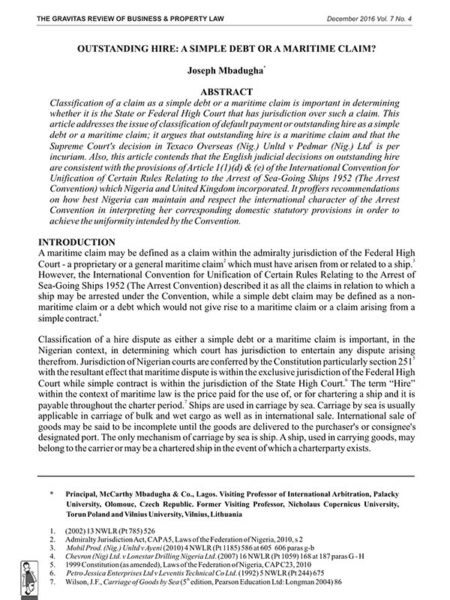
Outstanding Hire: A Simple Debt or Maritime Claim?
0₦2,500.00Joseph Mbadugha of McCarthy Mbadugha & Co and former Visiting Professor, Nicholaus Copernicus University of Torun Poland and at Vilnius University, Vilnius, Lithuania in his article “Outstanding Hire: A Simple Debt or A Maritime Claim?” examines the classification of a claim as either a simple debt or a maritime claim and its implication on whether it is the State or Federal High Court that has jurisdiction over such a claim. He argues that despite the domestication of Article 1(1)(d) & (e) of the International Convention for Unification of Certain Rules Relating to the Arrest of Sea-Going Ships 1952 (The Arrest Convention) in Section 2(3)(f) of the Nigerian Admiralty Jurisdiction Act 1991 (AJA) an in 20(2)(h) of the English Supreme Court 1981, only the English Courts have stayed true to the spirit of the Convention. He argues that the Supreme Court decision in Texaco Overseas (Nig.) Unltd v Pedmar (Nig.) Ltd in blurring the distinction between a Charterparty and a Bill of Lading Contract, was reached per incuriam.
-
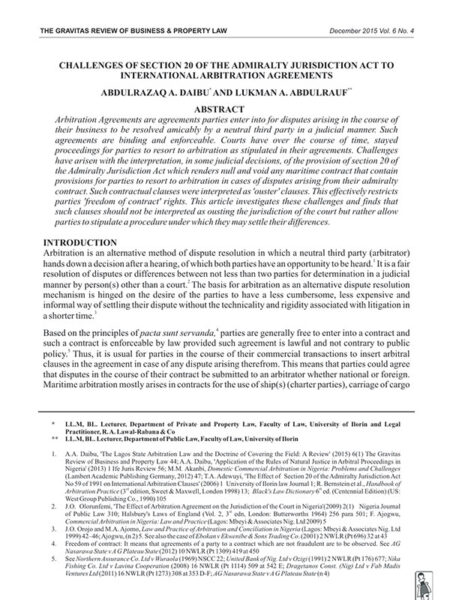
Challenges of Section 20 of the Admiralty Jurisdiction Act to International Arbitration Agreements
0₦2,500.00Abdulrazaq Daibu and Lukman Abdulrauf, Lecturers, Faculty of Law, University of Ilorin in “Challenges of Section 20 of the Admiralty Jurisdiction Act to International Arbitration Agreements” considers the interpretation of section 20 AJA by some courts and the challenges such an interpretation poses to parties ‘freedom of contract’ rights and maritime arbitration.
The Gravitas Review of Business & Property Law



